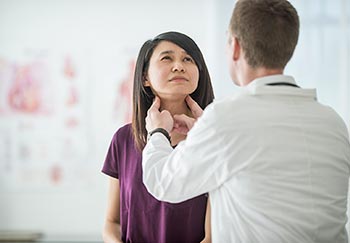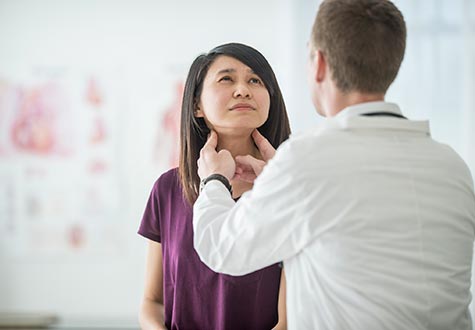
My mother, my aunt, and my grandmother have hypothyroid issues. As a kid, I remember thinking that having a thyroid problem seemed like something that happened to old people. It had nothing to do with me.
That was then, and this is now: I’ve crossed over the age of 40 and am suddenly aware that I have a high chance of inheriting all those aches and pains of the females in my family.
But the thyroid has remained, all these years, fairly mysterious to me. So, in honor of Thyroid Awareness Month, I figured it was time to get educated.
A Brief Introduction to the Thyroid
The thyroid. It’s a gland. Glands create hormones. When the amount of hormone created stabilizes, the body’s systems get the messages they need to do things like menstruate, nurse a baby and build muscle. It depends on the gland what the hormones do. Your thyroid has the job of controlling how fast or slow your brain, heart, muscles, liver, and other parts of your body work, aka your metabolism.
As such, the thyroid is a pretty key player. Too much thyroid hormone – called Graves’ disease or hyperthyroidism — results in an overflow of energy. An underactive thyroid creating too little hormone causes hypothyroidism, also called Hashimotos, sucks you of energy.
Left untreated, thyroid disorders can cause:
- Infertility
- Heart disease
- Cardiac arrest
- Heart rhythm problems
- Osteoporosis
The Thyroid, Women and Autoimmune Disease
Thyroid issues affect women more than men. In fact, one in eight women will have a thyroid problem; one out of 10 will develop an underactive thyroid, or Hashimotos, at a 5 to 8 percent increase in prevalence in women versus men.
Why? The answer isn’t clear. But clues exist. Margaret Crook, MD, tells me that women contract autoimmune diseases at a rate three times that of men. And guess what? “Close to 100 percent of the time, thyroid dysfunction comes from autoimmune disease,” Crook says. And “it tends to be genetic; you’re born with your immune system, so you have a propensity to develop autoimmunity, and then some sort of trigger can get it started.”
One of the most notable triggers for the onset of an autoimmune disease — pregnancy.
“Our immune system has to adapt to having something foreign in our body; it becomes more ‘immune tolerant.’ Estrogen levels going up and down, etc.,” Crook explains. “After this, autoimmune disease can flare.” Aside from those who develop a brewing autoimmune thyroid disease, 10 percent of women experience postpartum thyroiditis, or inflammation of the thyroid after giving birth.
It almost seems like a mythic curse, that the birth of a child can activate a disease. Autoimmunity waits in your genes, like a sleeping princess, waiting to be woken with a kiss — or, in the case of thyroid disease, with a surge of estrogen.
The Sneaky Symptoms of an Underactive Thyroid
I asked my mother how she knew when she had thyroid problems.
The short answer was: She didn’t.
“I was tired all the time and colder than everyone else,” she said. But that didn’t mean anything to her until she had a blood test.
Thyroid disease doesn’t just kick in and make itself known outright. My mom’s experience is fairly common. Hypothyroidism symptoms in women are easy to ignore.
“The trouble is,” explains endocrinologist Christine Burt Solorzano, MD, “that symptoms of hypothyroidism — feeling cold, tired or constipated, with dry skin or hair — are relatively non-specific. There is much overlap with other health conditions, such as depression, irritable bowel syndrome or celiac disease, or from other environmental causes, such as chronic sleep deprivation, poor diet or stress.”
That is, it’s easy to ignore feelings of exhaustion when you’re caring for a newborn, working full-time or juggling crazy schedules. As Crook laughs, “Who isn’t overtired?!”
Solorzano agrees. “Many women, in particular, may be used to sleep deprivation from years of balancing work-home responsibilities. Many girls or women may not realize that their symptoms could be due to a treatable health problem, instead of attributing it solely to stress.”
Sometimes, hypothyroidism hides behind menopause symptoms. Menopause is the other time frame when drastic hormone shifts occur and thyroid problems get triggered. So menstrual period irregularity, a sign of hypothyroid issues, gets written off as a result of menopause.
Symptoms of Hypothyroid Issues
A combination of any of the following could be signs of an underactive thyroid:
- Fatigue
- Cold intolerance
- Constipation
- Depressed
- Dry skin
- Hair thinning
- Enlarged thyroid
- Discomfort in throat
- Fuzzy or foggy brain
The remedy, Solorzano says, is for thyroid issues to be checked or screened for when looking at other conditions. And for women to take these symptoms seriously enough to get them checked.
Current medical science shines when it comes to the ability to diagnose endocrine disorders.
“Endocrinologists love blood work,” Crook says. “We can really see what’s going on with the feedback loops. TSH levels will rise if the thyroid is not doing its job. We can also check thyroid antibodies. Family history can help us, too.”
Do You Have a Hormone Imbalance or Metabolic Issue?
Find an expert in treating endocrine disorders.
Treating Hypothyroid Issues
In 1475, a physician named Wang Hei prescribed dried thyroid to treat enlarged thyroids, also known as goiters. In the early 1900s, Kocher recommended “a half sheep’s thyroid” fried and eaten with jelly for Grave’s disease, after the removal of said thyroid. In the 1960s, thyroid issues were still being treated with desiccated animal thyroid.
In other words, we’ve been treating thyroid issues with thyroid hormone for a long time. We still do it today. Treatments are sophisticated and synthetic, but operate on the same principle. “We can replace a hormone, but we can’t override the system,” Crook explains.
If the lack of progress surprises you, consider the complexity of the endocrine system. The pituitary, serving as the master gland or thermostat, maintains a very fine balance, or homeostasis, interacting with several glands and keeping numerous independent feedback loops in equilibrium.
On top of that, we still have a lot to learn about treating autoimmune disease. “We actually don’t have a way really good to get rid of autoimmunity,” Crook says. “For instance, people who have rheumatoid arthritis get really potent drugs to suppress their immune system. There’s a lot of risk associated with that kind of medicine.”
And if you have one autoimmune disease, you’re more likely to develop another.
Preventing Thyroid Issues
If you Google “thyroid treatments,” you’ll find a lot of theories out there about diet, gut flora, environmental factors.
That’s because endocrine disorders are often autoimmune disorders, and research shows complex relationships between gut health and both of those body systems.
While Crook hasn’t seen Paleo or other so-called autoimmune diets reduce a patient’s need for thyroid hormone, she thinks that healthy eating matters.
She also doesn’t count out environmental factors disrupting endocrine systems. But, “It’s hard to know what our exposures are,” she says. “A lot of chemicals in our environment like to bind into fat and stay there for a long time. But a lot of this isn’t studied.”
At the end of the day, there isn’t any surefire way to naturally prevent or treat thyroid disease. What can you do? “Buy foods in the outside aisles of the floor. Don’t buy anything with 50 ingredients you can’t read. Exercise, get plenty of sleep, eat healthy.”
This is the key message Crook tells her patients. “You only have one body, just treat it as good as you can.”
